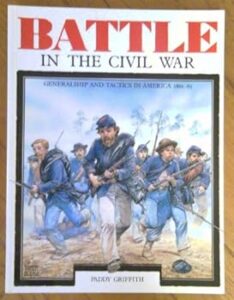Our Favorite Books: Bert Dunkerly’s Top 5 Books
Like many of you, I certainly appreciate some of the classic studies like Johnny Reb and Billy Yank and greatly admire works like Battle Cry of Freedom and Gordon Rhea’s Overland Campaign series. Yet I want to focus on a few that have impacted me and that I continue to refer back to.
All for the Regiment by Gerald Prokopowicz
This outstanding book got me really thinking about how armies function before, during, and after combat. The author introduced ideas that resonated with me because I saw those things in my own battle research. He explained how, despite fighting large and terrible battles, Civil War armies would bend but not break. Recruited at the local level and with unit loyalty concentrated at the regimental level, armies composed of these regiments were large and unwieldy to manage. They could fight doggedly, take massive losses, and still be able to function when routed. As the author points out, even despite devastating attacks at Stones River or Chickamauga, armies were resilient and did not rout easily. Opposing forces were rarely able to follow up and exploit initial success, no matter who commanded.

Battle in the Civil War by Paddy Griffith
Griffin’s book also touches on army organization, deployment, and how combat unfolds. It is largely a picture book, and yes, that’s why I like it! Working on a battlefield that covers several square miles, it is difficult to envision how an army deployed on the landscape and engaged in combat, much less explain it to visitors. This book helps show what this looked like and allows readers to understand the minutia of deploying an army. Chapters focus on an army’s internal communication between commanders at various levels, scouting, deploying, and changing formations. The author also goes deeply into the details of attacks, discussing weapons ranges, skirmishing, the use of reserves, artillery support, and tactics. It’s a great primer on Civil War combat.
 What They Fought For by James McPherson
What They Fought For by James McPherson
This is an outstanding and concise little book on the why soldiers fought, it is simply a must for anyone who wants to understand their motivations. The author explores ideas on patriotism from both sides. McPherson shows how ideologies, under the stress of combat and soldier, eventually gave way to less abstract ideas like soldiers fighting for comrades. Along the way we learn about their concepts of liberty, and how both sides felt that they were defending the legacy of the Revolution. Critical related topics are explored, such as desertion, immigrants, substitutes, and conscription. The research is outstanding and I consider this one of those foundational books that our future interpretations are built on. The author also touches on important post war attitudes of veterans.
Seeing The Elephant by Joseph Frank and George A. Reaves
I’ll admit it, I’m an ‘early war’ guy. The process of armies forming, learning to function, and entering their first battle is fascinating to me. This is one of the best book about the first combat experiences of soldiers, in this case, at Shiloh. The authors explore how soldiers experienced and processed such a terrible experience as a battle on this scale. Especially traumatic was the aftermath of battle: the killed and wounded, and destruction and debris. Combat changes motivaions and expectations, sodliers bacme more serious with less lotfy ideas. This is a great, detailed study on a major battle.
Why Confederates Fought by Aaron Sheehan-Dean
This is a great study on Virginia’s Confederate soldiers and their motivations. An astounding 70 percent of Virginia’s white males of military age fought in the war, the most of any state. In exploring this topic the author focuses on the importance of the war effort: how the war was waged and managed. We see how things changed over time, from overwhelming enthusiasm in 1861 to factionalism on the home front as the war dragged on. Confederates were optimistic in 1864 with Lincoln up for reelection. They had gone so far and sacrficed so much, the stakes were so high, they simply could not lose. The importance of conscription, motivations, recruiting, and shifting morale all round out this thorough study.

What They Fought For is an outstanding book. Puts it all in perspective.
Seeing The Elephant is my favorite Shiloh book.
The Paddy Griffith is great